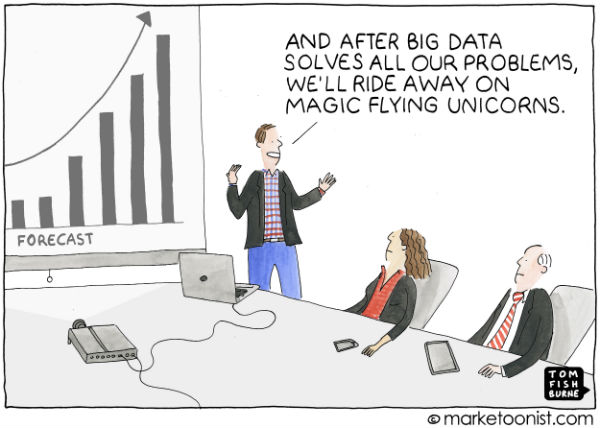
Driven by trends in lower performing advertising and changing consumer behaviors, many marketers have embraced content with the majority of companies adopting the practice.
According to CMI and MarketingProfs 2017 Content Marketing Benchmark report, the most successful B2B marketers spend an average of 39% of their marketing budget on content marketing and 39% plan on increasing spending in 2017.
However, even with the promise of greater marketing performance through content, organizations are challenged to produce a variety of engaging content on a consistent basis and there are a few key reasons why:
- 41% of marketers are clear on what an effective content marketing program looks like
- 36% are somewhat committed or not committed at all
- 75% are minimally or moderately successful at content marketing
What’s missing in the content marketing success equation where clarity is not so clear, commitment is not in full force and most companies think their success needs improvement?
Data.
A study by Forrester reports that companies only analyze 12 percent of the data they have available.
While there are numerous resources available from platforms to best practices, many marketers implement a sizable percentage of their content creation efforts based on something other than data. A 2016 study by Conductor found that 38% of content marketers rarely use data and 45% of B2C content marketers don’t target their content.
When it comes to content, creators are traditionally more art than science and using data to guide editorial planning is still not an advanced skill for many companies. In many other cases, content creators don’t have access to analysts to interpret data in a meaningful way or the tools and training to do it themselves.
Despite these obstacles, an international study by GDMA and the Winterberry Group, found that 80% of respondents believe customer data is critical to their marketing and advertising efforts. Top digital marketing executives agree:
“If you aren’t using data to inform your content strategy, what are you using? Gut feeling, testing, and / or creative epiphany should drive no more than 25% of your content efforts. The rest should be driven by understanding what content is resulting in conversions, assisted conversions, traffic from search and social, and what your audiences are looking for online in relation to your business offering.”
Jolina Pettice (/in/jolina-pettice) Vice President at TopRank Marketing
For some companies most of the available data to direct content creation comes from a variety of sources. There is value in understanding customer preferences through different data sources. In particular, an understanding of customer preferences for information discovery, consumption and interaction while looking for solutions are key. This kind of data insight helps reach some of the top goals marketers have for using data including a better customer experience and optimizing performance of campaigns.
“Understanding how to use data to drive to the right client conversations has become the most powerful weapon in a marketer’s toolkit. Using different types of data – intent data, behavioral data, purchase data – is key to driving engagement and building a demand funnel. We use data for early stage engagement to inform our content marketing editorial calendar and campaign strategy and also to build buyer journeys by successfully converting inquires into sales conversations.”
Tami Cannizzaro (@tamicann) Vice President, North America Marketing at CA Technologies
Beyond the opportunity for better marketing and personalization, data informed content experiences are expected by customers. The use of data to create and present the right content for the right audience at the right time is something customers experience on a daily basis and for brands that don’t it can create a disadvantage.
“Data is more critical than ever because users increasingly expect highly relevant experiences. Amazon, Google, Netflix and other online services have trained users to expect speed and personalized experiences. This has trained users to expect these relevant experiences. If content marketing doesn’t grab attention immediately, it won’t be effective. Marketers have to step up their games using data to ensure that the content is relevant to the persona, and the targeting is right so the content speaks to the user’s mindset and needs.”
Russell Glass (@glassruss) VP Products, LinkedIn Marketing Solutions
It can be tempting for marketers to approach data informed content marketing practices purely through applied tactics, without attention to operational considerations. A holistic view from a marketing strategy standpoint as well as how it applies organizationally can create efficiencies for implementation and performance optimization.
“A data-inspired framework is absolutely essential for modern marketers. To implement this necessity, we’ve fully integrated our content and demand gen organizations, with shared editorial planning and KPIs across the entire customer journey. With these common insights, our teams have built a continuous feedback loop – from topic selection through performance – that ensures every piece of content we create has a purpose and is measured against that purpose.”
Josh Mueller (@jmueller03) SVP, Global Marketing at Dun & Bradstreet
As far as we’ve come with content marketing, many companies still take a brand-centric, some say ego-centric, view of content. When empathy with the customer information journey is not front and center of content marketing planning, there is no motivation to collect, interpret and apply data. Senior marketing executives must make an effort understand this disconnect and implement change and resources in their marketing to leverage insights from data to create better customer experiences.
The role data plays in informing more effective content should focus on goals and measurement, successes and failures. It is the age old approach of scaling what’s working and discontinuing what’s not. That starts with having clear objectives documented for the contribution content will make to marketing and the key metrics used to track performance.
Senior marketing executives leading their organizations to more substantial and measurable returns from content marketing investments must focus on 3 key areas when it comes to content and experience:
Content Discovery:
Understand how the intended audience finds solutions. What do they search for? What social channels to they engage? What publications to the read? What information sources do they subscribe to? What are their influences?
For most companies, data is available to answer all of these questions and when mapped to a content marketing strategy, solves one of the most problematic issues marketers face: reach and engagement.
Content Consumption:
Delivering content to customers in the formats and channels they prefer is as essential as the topics and utility provided. Do your customers prefer video or long form text? Are they using mobile devices, tablets or computers? Which questions will you answer for buyers at each stage of their journey to find a solution?
Marketers must tap into the data needed to identify these content format and topic preferences to create the best experience possible. It is not enough to be found, marketers must use data to understand how to inform and create a great experience for customers with content.
Content Action:
Findable content that satisfies customer information needs isn’t effective for the brand unless it inspires action. According to the goals of the content for the intended audience, marketers should use data insights to understand the triggers that motivate desired actions whether a sale, a share or a referral.
Beyond inquiries and sales transactions, there are many other actions marketers can motivate in customers through content ranging from registrations, downloads, demos and subscriptions that lead to nurturing programs to social sharing and even advocacy to their peers.
Each of these areas can be informed with data. From web analytics to customer surveys to machine learning systems and artificial intelligence, there are numerous tools and resources that chief marketing offices have at their disposal to leverage data for insights that can more effectively inform content marketing.
The good news is that there is a trend upwards for using data in marketing with 53% of survey participants citing an increase in spending on data-driven marketing and advertising in 2016 according to the GDMA and Winterberry Group study.
Of course, to implement a data informed approach to content requires a framework that guides collection, analysis and management.
3 Sources for Data Informed Content Marketing
1. Search and social data. Google Analytics and Search Console, Moz, Brandwatch, BuzzSumo and many other specialty tools can provide marketers with actionable data insights for their content planning.
According to the 2017 CMI and MarketingProfs B2B Content Marketing report,
- 58% use website analysis,
- 57% use keyword research,
- 50% use employee feedback,
- 47% use competitive analysis,
- 44% use social listening,
- 42% use customer feedback,
- 40% use A/B testing and
- 37% use secondary data analysis
to inform their content.
2. Content Platform Analytics. Content Marketing platforms are increasingly integrating an analytics and insight component to better inform marketers about what kind of content is performing.
For example, Curata’s Content Marketing Platform (CMP) blends analytics with an editorial calendar integrating with technologies such as Google Analytics, Marketo, Eloqua, Pardot and Salesforce, enabling users to gain insight into the revenue generated by individual pieces of content
3. Predictive, Cognitive and AI. Predictive marketing solutions like Everstring (client) and cognitive solutions that leverage machine learning and AI like IBM Watson are exploding on to the market to provide companies that have vast amounts of structured and unstructured data to work with, a way to understand patterns, trends and even predict what kind of content or promotions will work best.
A solid content marketing framework that leverages data insights must focus on understanding customers in their journey to discover, consume and engage with content. Brands that master their ability to document a data informed content marketing strategy with clear measurement will be in a much better position to achieve goals in 2017 and beyond.
A version of this article was originally published on CMO.com.



